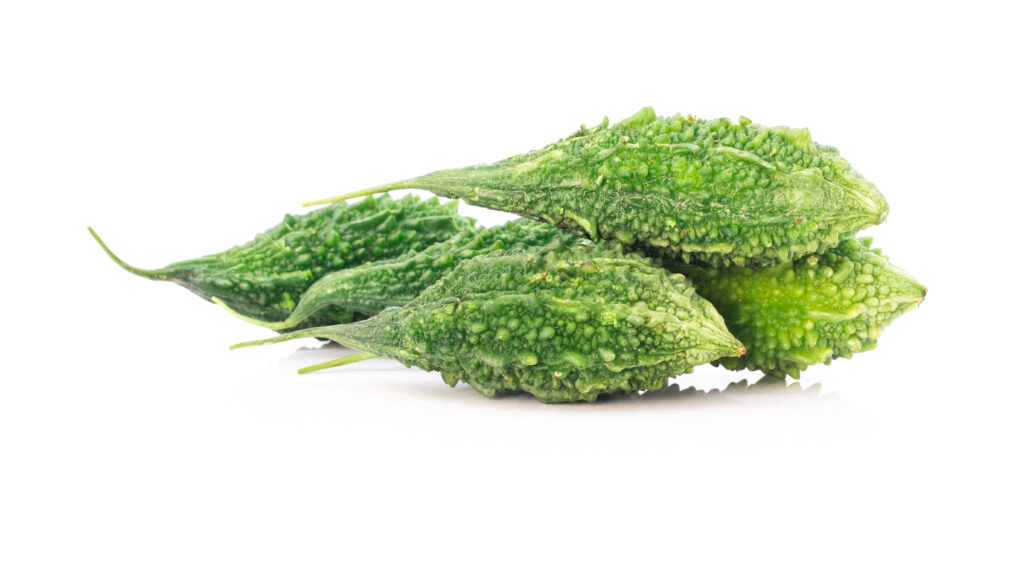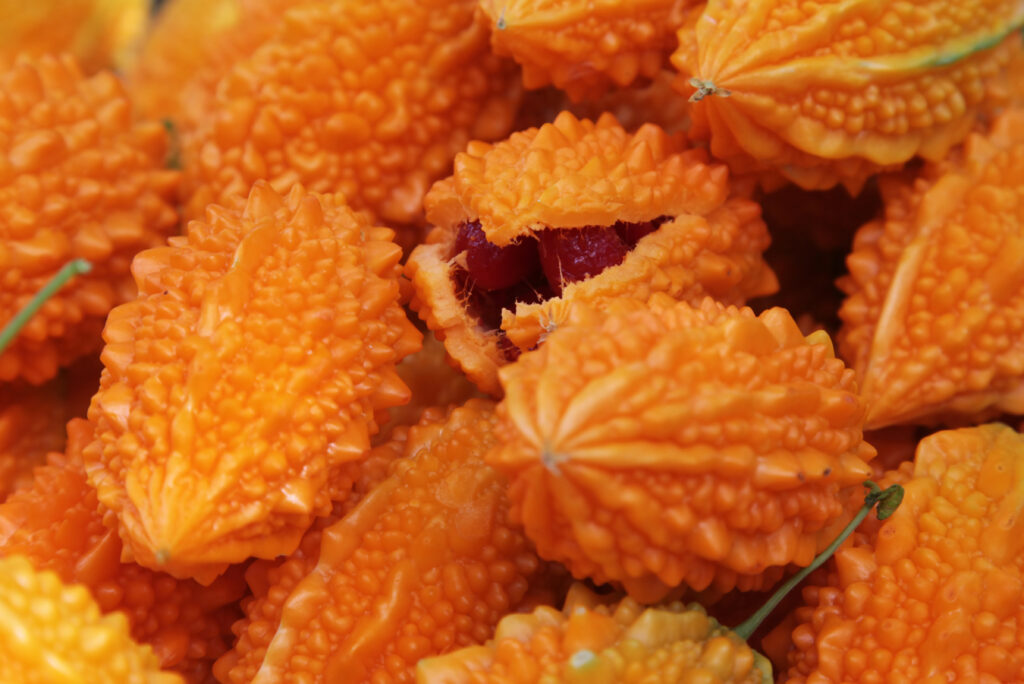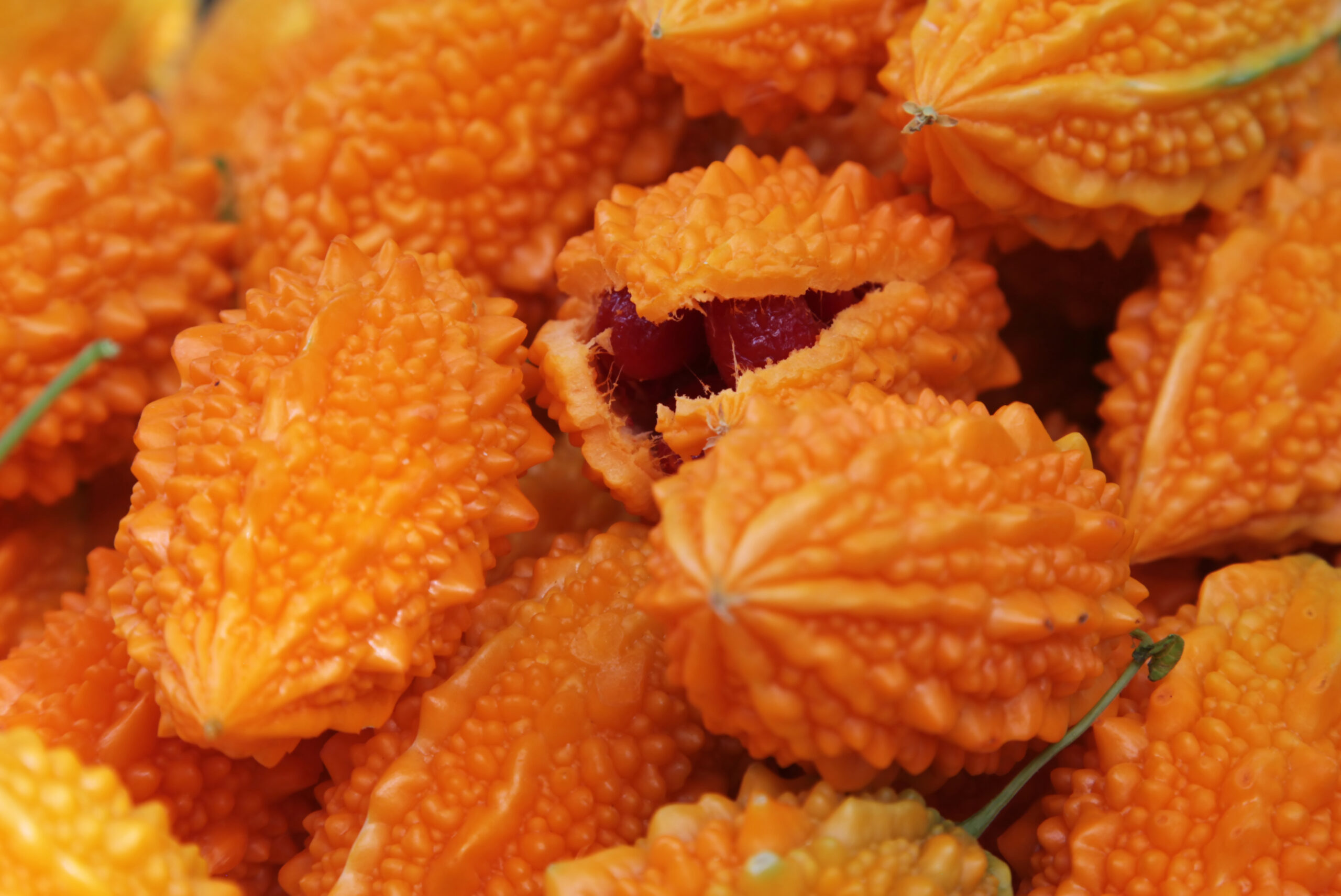Some of the links on this page are affiliate links, which means that Buzzy Kitchen earns commission from purchases made – at absolutely no extra cost to you. Thank you so much for supporting Buzzy Kitchen!
The balsam apple is known by a host of other names, including the balsam pear, bitter melon, African cucumber, nkaka, and cacana. Once upon a time, this brightly-coloured fruit was used for medicinal purposes, but does it have other purposes, too? Can you eat a balsam apple? And if so, how do you eat it?
Why don’t we take a closer look?
What is a Balsam Apple?
Depending on where you are in the world, you may know the balsam apple by even more names than what I’ve already told you about.
In some places, where it is an invasive plant (such as Florida), it has been given unpleasant nicknames such as diaper weed and stink weed. When pulled from the ground, this vine smells just as unpleasant as the nicknames would lead you to believe.
Some Asian countries call this fruit bitter gourd, because of its close connection and resemblance to another popular Asian ingredient: the bitter gourd or bitter melon.
Although similar, balsam apples and bitter melons are not the same fruit.
Despite the name, the balsam apple isn’t actually a type of apple at all. It is also not an ingredient found in balsamic vinegar. Instead, it is a relative of another fruit: the bitter melon, and the balsam apple is also classed as a berry.
The scientific name for the balsam apple is Momordica balsamina, and it originally grew in areas of Africa where the climate could be describe as tropical. These days, however, the plant has been introduced to a wide number of other countries and continents, and it is even considered to be a nuisance species of plant in some places.
In Central and North America, Australia, Asia, and even some parts of Europe, it is classed as an introduced and invasive species. In Florida, homeowners regularly complain about the plant growing out of control in back yards.
In areas of continuously-moist soil and full sun the balsam apple plant can grow to out-of-control levels and is notoriously difficult to get rid of. It will continue to grow, bloom, and sow seeds year after year with no intervention.
Can You Eat a Balsam Apple?
Yes, you can eat a balsam apple – but only during the younger part of the berry’s life cycle.
You should only eat this type of fruit when it is in its younger form. As the fruit matures, it loses its edibility and flavour as well as changing colour.

Young balsam apples are still a yellow-green shade, even verging into almost gold. They get greener as they age. Once they have started to make the switch from green-yellow to orange-red, they are past the point at which you should eat them, or would want to eat them.
Mature balsam apples that are bright red or orange in colour are potentially toxic and are also likely to taste very bitter.
The more orange balsam apples are, the more bitter and potentially toxic they are.
Is the Balsam Apple Poisonous?
Yes, the balsam apple has the potential to be poisonous.
If you see this fruit in its orange stage, just like the photo below, it is not considered to be safe to eat.
Once matured, the fruit starts to split open, revealing the mass of red seeds inside. You shouldn’t eat balsam apples that have split open, or are in the process of splitting open.

Once the fruit has turned to an orange or red shade, it has passed the point at which it can be safely eaten. Not only will the fruit taste rather unpleasant (it is a relative of the bitter melon, after all) but it can also cause some quite unpleasant side effects. These include an upset stomach with nausea, vomiting and diarrhea.
Although it can make you rather unwell, the poison severity level is quite low. It is incredibly unlikely that you will become seriously unwell or die as a result of eating a mature balsam apple.
It was once thought that the balsam apple has toxic or poisonous sticky seeds, plus a toxic or poisonous outer rind of the fruit, but this myth appears to have been somewhat dispelled. People in South Africa, Cameroon, Sudan, and southern areas of Mozambique are said to cook and eat almost all parts of young balsam apples, including the leaves, on a regular basis, with no side effects or repercussions.
As an aside, the young balsam apple fruits and leaves are cooked before they are eaten, much like a vegetable.
They are not eaten raw, like a typical fruit.
Raw seeds and fruit of the balsam apple can have mildly toxic effects, much like the older, more mature version of the fruit.
How to Eat a Balsam Apple
As previously mentioned, the balsam apple needs to be eaten in cooked form rather than raw. The berry is quite bitter, with the bitter melon familial connection, and needs other flavours to help balance it out.
Some cultures and communities eat young balsam apples as a vegetable, peeling and cutting the fruit, before cooking (boiling) the fruits and leaves.
In India, for example, it is eaten as a vegetable despite it’s bitter-melon likeness.
In Asian cultures, the balsam apple is used in stir fry dishes.
In some parts of Central America, the balsam apple is known by the name sorosi and it used in the creation of a tea-like beverage.
And in Brazil, the seeds are eaten as a snack, usually cooked.
What Does a Balsam Apple Taste Like?
The balsam apple tastes bitter, similar to that of bitter melon – and it’s no wonder, because the two fruits are related.
Cooking a balsam apple tones down the level of bitterness considerably (and reduces the chances of you suffering from any side effects as a result of the potentially toxic fruit), but it does still have a tart-bitterness in its cooked form.
It’ll leave your mouth feeling dry, that’s for sure!
Not all of the berry is bitter, though. The seeds are quite sweet-tasting compared to the rest of the fruit.
Useful Resources & Sources:
Momordica Balsamina | North Carolina Plant Toolbox
